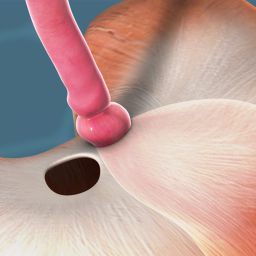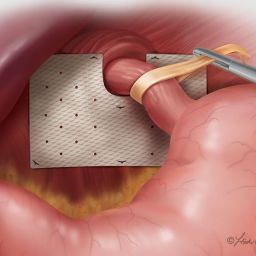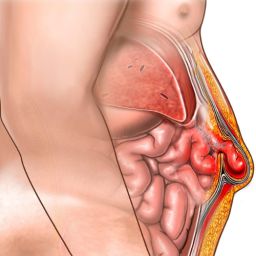
1. How Pregnancy Affects the Risk of Developing a Stomach Hernia
Pregnancy brings about a number of physiological changes that may increase the risk of developing a stomach hernia or exacerbate an existing one. Here are the key factors that contribute to the development or worsening of a hiatal hernia during pregnancy:
Hormonal Changes
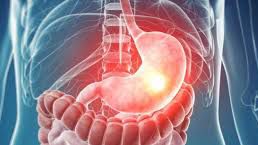
During pregnancy, the body produces higher levels of the hormone progesterone, which relaxes muscles throughout the body, including the lower esophageal sphincter (LES). The LES is a muscle that separates the stomach from the esophagus, preventing stomach acid from traveling upwards. When progesterone relaxes the LES, it increases the likelihood of acid reflux, a key symptom of hiatal hernias.
Additionally, progesterone can relax the diaphragm muscles, potentially allowing the stomach to slide more easily into the chest cavity, thereby exacerbating a pre-existing hernia or contributing to the formation of a new one.
Increased Abdominal Pressure
As the uterus grows to accommodate the developing baby, the increased pressure within the abdominal cavity can push up against the diaphragm. This pressure can cause the stomach to slide into the chest, worsening the symptoms of a hiatal hernia. Pregnant women may experience more frequent acid reflux, heartburn, and discomfort due to this increased pressure on the stomach.
Digestive Changes
Pregnancy can lead to changes in digestion and gastrointestinal function. Slower digestion and gastrointestinal motility are common due to hormonal fluctuations, particularly progesterone. This can result in bloating, constipation, and indigestion, all of which may exacerbate the symptoms of a hiatal hernia.
Weight Gain
Pregnancy is often associated with weight gain, which can increase abdominal pressure even further. This added pressure on the stomach can make it easier for the stomach to push up through the diaphragm, contributing to the worsening of a hiatal hernia.
Posture Changes
As the pregnancy progresses, women tend to change their posture to accommodate their growing belly. These postural adjustments can sometimes lead to additional pressure on the abdomen, potentially making a hiatal hernia more pronounced.
2. Risks and Symptoms of Stomach Hernia During Pregnancy
The presence of a hiatal hernia during pregnancy can lead to a number of potential risks and complications, both for the mother and the baby. Understanding these risks is crucial for pregnant women to properly manage the condition and minimize discomfort.
1. Increased Risk of Acid Reflux and Heartburn
One of the most common symptoms of a hiatal hernia during pregnancy is acid reflux or heartburn. The relaxing of the lower esophageal sphincter due to hormonal changes, combined with increased abdominal pressure, can allow stomach acid to move up into the esophagus, causing the familiar burning sensation in the chest. This condition can be uncomfortable and interfere with daily activities, especially if it occurs frequently.
2. Difficulty Swallowing (Dysphagia)
A hiatal hernia can also cause difficulty swallowing (dysphagia), which may be worsened during pregnancy due to the growing uterus exerting more pressure on the esophagus. This can lead to a sensation of food getting “stuck” in the chest or throat, and it may become more pronounced with the hormonal changes that affect the esophagus and stomach during pregnancy.
3. Gastric Ulcers and Esophagitis
Constant acid reflux caused by a hiatal hernia can lead to irritation of the esophagus, potentially resulting in conditions like esophagitis (inflammation of the esophagus) or the development of gastric ulcers. These conditions can cause pain, discomfort, and sometimes bleeding, which can be a concern during pregnancy.
4. Preterm Labor
In severe cases, excessive acid reflux and the resulting inflammation may increase the likelihood of complications such as preterm labor. While this is not common, severe discomfort and pressure on the stomach can cause uterine contractions, which could trigger premature labor in some pregnant women.
5. Respiratory Issues
A large hiatal hernia, particularly a paraesophageal hernia, can compress the lungs or diaphragm, leading to shortness of breath and difficulty breathing, especially as the pregnancy progresses. In rare cases, the hernia can also cause aspiration, where food or liquid may enter the lungs, leading to respiratory infections.
3. Managing Stomach Hernia During Pregnancy
While a hiatal hernia may pose certain risks and complications during pregnancy, there are several strategies that can help manage the condition and alleviate symptoms.
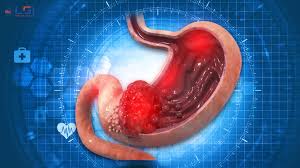
1. Dietary Adjustments
Diet plays a significant role in managing a hiatal hernia. Making certain adjustments can reduce symptoms such as acid reflux and heartburn:
- Eat smaller, more frequent meals: Instead of three large meals, try eating five or six smaller meals throughout the day. This reduces pressure on the stomach and minimizes the chances of acid reflux.
- Avoid trigger foods: Certain foods are known to worsen acid reflux, including spicy foods, citrus, chocolate, caffeine, and fried or fatty foods. Avoiding these foods can significantly reduce symptoms.
- Stay upright after eating: After meals, try to remain in an upright position for at least 30 minutes to prevent stomach acid from rising into the esophagus.
- Eat slowly and chew thoroughly: Eating too quickly can increase the risk of reflux. Take time to chew food properly and avoid overeating.
2. Lifestyle Modifications
Along with dietary changes, making some lifestyle modifications can help manage the symptoms of a hiatal hernia during pregnancy:
- Wear loose-fitting clothes: Tight clothing, especially around the abdomen, can exacerbate the pressure on the stomach. Opt for loose and comfortable clothing to minimize discomfort.
- Avoid lying down immediately after eating: Wait at least 30 minutes to an hour before lying down or going to bed after eating. This allows gravity to help keep food and acid in the stomach.
- Sleep with your head elevated: Sleeping with the head of the bed elevated by about 6-8 inches can help prevent acid reflux during the night.
3. Medications and Antacids
While some medications are not recommended during pregnancy due to potential risks to the baby, there are safe options to manage symptoms of a hiatal hernia. Antacids containing calcium carbonate or magnesium hydroxide may help neutralize stomach acid and alleviate heartburn. However, it is important to consult with a healthcare provider before using any medication during pregnancy.
For more severe cases, a doctor may recommend H2 blockers (such as ranitidine) or proton pump inhibitors (PPIs) (like omeprazole), which reduce stomach acid production. These medications should only be used under the guidance of a healthcare professional.
4. Surgery (Rarely Needed)
In rare and extreme cases, when a hiatal hernia causes significant complications that cannot be managed through lifestyle modifications and medications, surgery may be considered. However, surgery during pregnancy is typically avoided unless absolutely necessary. The decision to proceed with surgery will depend on the severity of the hernia and the overall health of both the mother and the baby.
5. Consult a Healthcare Provider
Regular consultations with a healthcare provider, including a gastroenterologist or obstetrician, are crucial for managing a hiatal hernia during pregnancy. Your healthcare provider can offer personalized advice, prescribe medications, and monitor your condition throughout your pregnancy to ensure that both you and your baby remain healthy.
Pregnancy is a time of significant changes in a woman’s body, and a stomach hernia or hiatal hernia can add additional challenges. The hormonal changes, increased abdominal pressure, and digestive alterations that occur during pregnancy can contribute to the development or exacerbation of a hiatal hernia. This condition can lead to symptoms such as acid reflux, heartburn, difficulty swallowing, and even more severe complications.
Fortunately, with the right management strategies—including dietary adjustments, lifestyle changes, and medications—most women with a hiatal hernia can effectively manage their condition during pregnancy and enjoy a healthy pregnancy.
If you are pregnant and experiencing symptoms of a hiatal hernia, it is essential to consult with your healthcare provider for a thorough evaluation and to develop a tailored plan for managing the condition. By taking proactive steps, you can reduce the risks associated with stomach hernias and ensure the well-being of both you and your baby.

